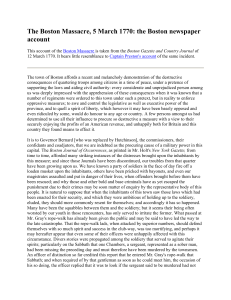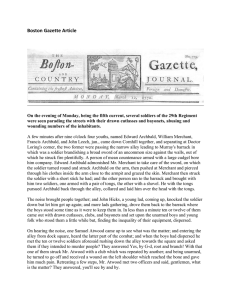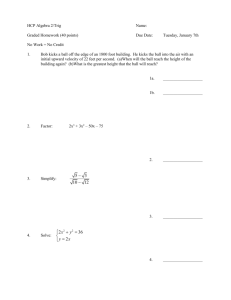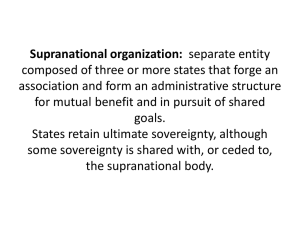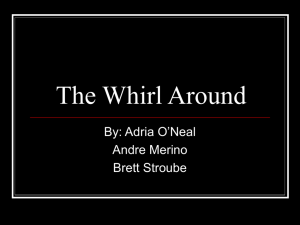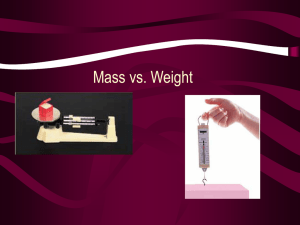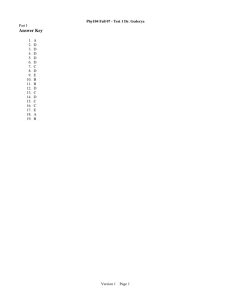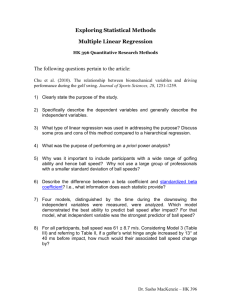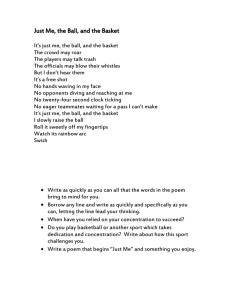Pre-Reading Document, Boston Gazette and Country Journal News
advertisement
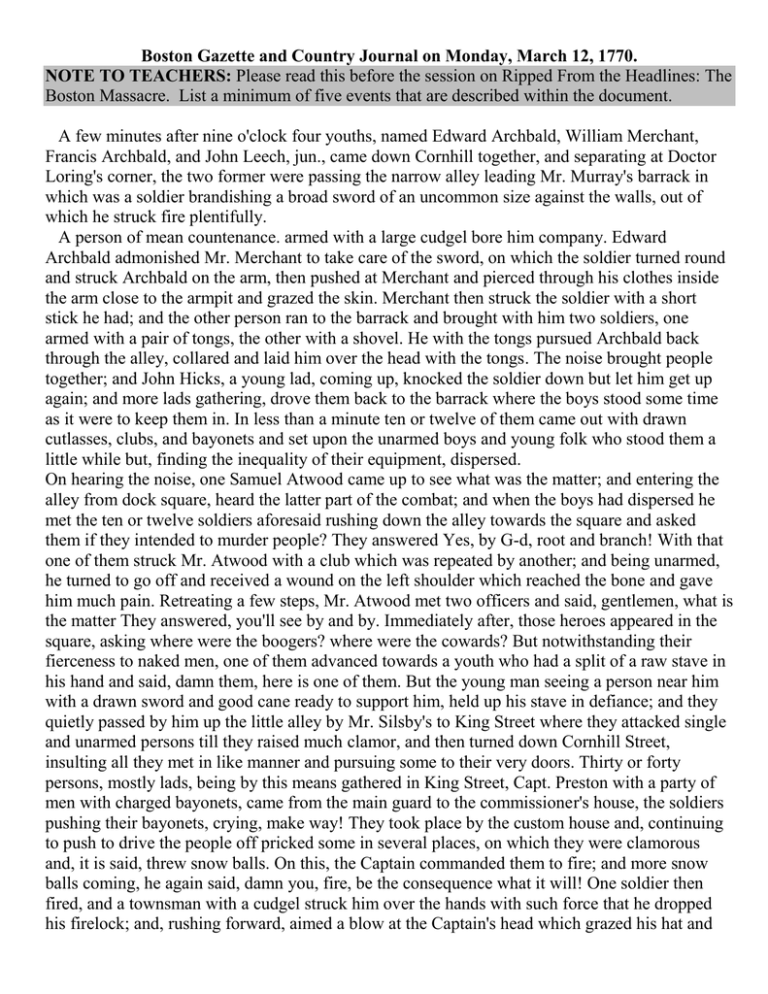
Boston Gazette and Country Journal on Monday, March 12, 1770. NOTE TO TEACHERS: Please read this before the session on Ripped From the Headlines: The Boston Massacre. List a minimum of five events that are described within the document. A few minutes after nine o'clock four youths, named Edward Archbald, William Merchant, Francis Archbald, and John Leech, jun., came down Cornhill together, and separating at Doctor Loring's corner, the two former were passing the narrow alley leading Mr. Murray's barrack in which was a soldier brandishing a broad sword of an uncommon size against the walls, out of which he struck fire plentifully. A person of mean countenance. armed with a large cudgel bore him company. Edward Archbald admonished Mr. Merchant to take care of the sword, on which the soldier turned round and struck Archbald on the arm, then pushed at Merchant and pierced through his clothes inside the arm close to the armpit and grazed the skin. Merchant then struck the soldier with a short stick he had; and the other person ran to the barrack and brought with him two soldiers, one armed with a pair of tongs, the other with a shovel. He with the tongs pursued Archbald back through the alley, collared and laid him over the head with the tongs. The noise brought people together; and John Hicks, a young lad, coming up, knocked the soldier down but let him get up again; and more lads gathering, drove them back to the barrack where the boys stood some time as it were to keep them in. In less than a minute ten or twelve of them came out with drawn cutlasses, clubs, and bayonets and set upon the unarmed boys and young folk who stood them a little while but, finding the inequality of their equipment, dispersed. On hearing the noise, one Samuel Atwood came up to see what was the matter; and entering the alley from dock square, heard the latter part of the combat; and when the boys had dispersed he met the ten or twelve soldiers aforesaid rushing down the alley towards the square and asked them if they intended to murder people? They answered Yes, by G-d, root and branch! With that one of them struck Mr. Atwood with a club which was repeated by another; and being unarmed, he turned to go off and received a wound on the left shoulder which reached the bone and gave him much pain. Retreating a few steps, Mr. Atwood met two officers and said, gentlemen, what is the matter They answered, you'll see by and by. Immediately after, those heroes appeared in the square, asking where were the boogers? where were the cowards? But notwithstanding their fierceness to naked men, one of them advanced towards a youth who had a split of a raw stave in his hand and said, damn them, here is one of them. But the young man seeing a person near him with a drawn sword and good cane ready to support him, held up his stave in defiance; and they quietly passed by him up the little alley by Mr. Silsby's to King Street where they attacked single and unarmed persons till they raised much clamor, and then turned down Cornhill Street, insulting all they met in like manner and pursuing some to their very doors. Thirty or forty persons, mostly lads, being by this means gathered in King Street, Capt. Preston with a party of men with charged bayonets, came from the main guard to the commissioner's house, the soldiers pushing their bayonets, crying, make way! They took place by the custom house and, continuing to push to drive the people off pricked some in several places, on which they were clamorous and, it is said, threw snow balls. On this, the Captain commanded them to fire; and more snow balls coming, he again said, damn you, fire, be the consequence what it will! One soldier then fired, and a townsman with a cudgel struck him over the hands with such force that he dropped his firelock; and, rushing forward, aimed a blow at the Captain's head which grazed his hat and fell pretty heavy upon his arm. However, the soldiers continued the fire successively till seven or eight or, as some say, eleven guns were discharged. By this fatal manoeuvre three men were laid dead on the spot and two more struggling for life; but what showed a degree of cruelty unknown to British troops, at least since the house of Hanover has directed their operation, was an attempt to fire upon or push with their bayonets the persons who undertook to remove the slain and wounded! To the Teacher: It is not necessary to list events about the dead and wounded. Mr. Benjamin Leigh, now undertaker in the Delph manufactory, came up and after some conversation with Capt. Preston relative to his conduct in this affair, advised him to draw off his men, with which he complied. The dead are Mr. Samuel Gray, killed on the spot, the ball entering his head and beating off a large portion of his skull. A mulatto man named Crispus Attucks, who was born in Framingham, but lately belonged to New-Providence and was here in order to go for North Carolina, also killed instantly, two balls entering his breast, one of them in special goring the right lobe of the lungs and a great part of the liver most horribly. Mr. James Caldwell, mate of Capt. Morton's vessel, in like manner killed by two balls entering his back. Mr. Samuel Maverick, a promising youth of seventeen years of age, son of the widow Maverick, and an apprentice to Mr. Greenwood, ivory-turner, mortally wounded; a ball went through his belly and was cut out at his back. He died the next morning. A lad named Christopher Monk, about seventeen years of age, an apprentice to Mr. Walker, shipwright, wounded; a ball entered his back about four inches above the left kidney near the spine and was cut out of the breast on the same side. Apprehended he will die. A lad named John Clark, about seventeen years of age, whose parents live at Medford, and an apprentice to Capt. Samuel Howard of this town, wounded; a ball entered just above his groin and came out at his hip on the opposite side. Apprehended he will die. Mr. Edward Payne of this town, merchant, standing at his entry door received a ball in his arm which shattered some of the bones. Mr. John Green, tailor, coming up Leverett's Lane, received a ball just under his hip and lodged in the under part of his thigh, which was extracted. Mr. Robert Patterson, a seafaring man, who was the person that had his trousers shot through in Richardson's affair, wounded; a ball went through his right arm, and he suffered a great loss of blood. Mr. Patrick Carr, about thirty years of age, who worked with Mr. Field, leather breeches-maker in Queen Street, wounded; a ball entered near his hip and went out at his side. A lad named David Parker, an apprentice to Mr. Eddy, the wheelwright, wounded; a ball entered his thigh. Source: The Boston Gazette and Country Journal, March 12, 1770
